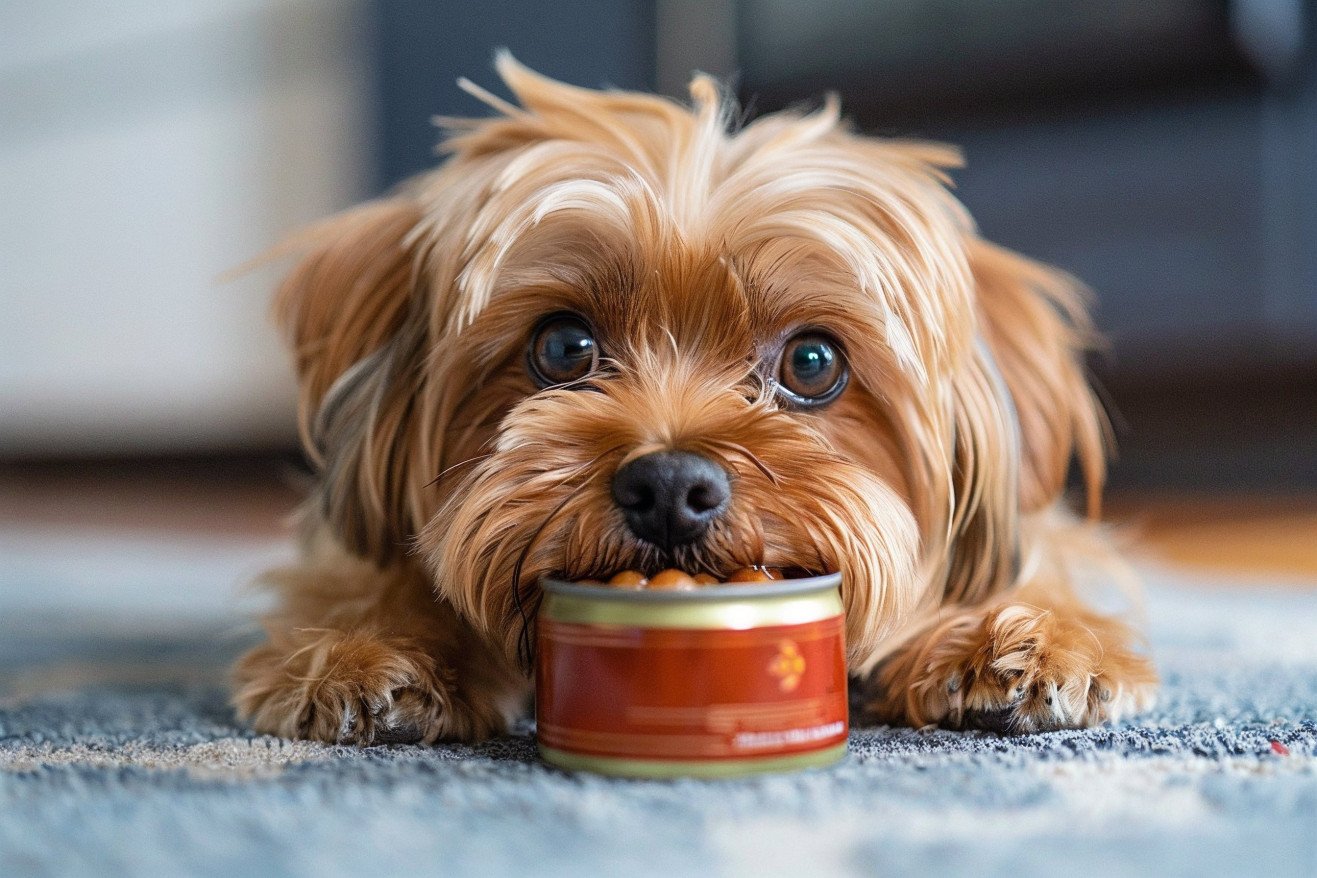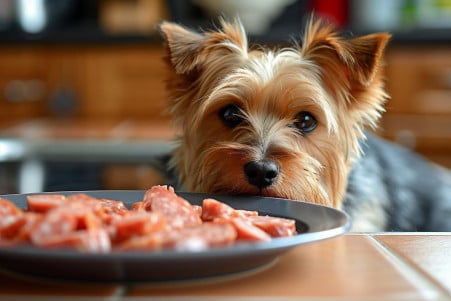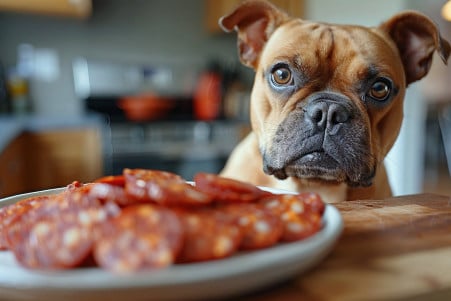Can Dogs Eat Vienna Sausages? Understanding the Risks
6 March 2024 • Updated 6 March 2024

Vienna sausages may be a convenient snack, but can you share them with your dog? While dogs can eat Vienna sausages in moderation, they are high in fat and salt, which can cause health problems like pancreatitis and obesity. As a result, it’s best to avoid giving your dog these processed meats.
To learn more about why Vienna sausages aren’t a good choice for your dog, we’ll cover a variety of information from veterinarians and nutrition experts. This will include a look at what dogs need in their diets, the problems with high fat and salt levels, and the dangers of processed meats. With this information, we hope to help you better understand the best and healthiest options for your furry friend.
Can dogs eat Vienna sausages?
What’s in Vienna Sausages?
Vienna sausages, a type of processed meat, are made with ingredients that are not good for your dog. High in sodium and fat, these sausages contain more than the recommended daily intake of nutrients for your dog. According to Rover.com, if dogs eat Vienna sausages regularly, the high fat and sodium content can lead to digestive issues, kidney damage, or pancreatitis.
In addition to being high in fat and sodium, Vienna sausages also contain garlic and onion powder, which are toxic to dogs and can lead to gastrointestinal issues, as pointed out by Rootsyliving. Dogs that have eaten garlic and onion powder can experience bloating, increased urination, vomiting, and diarrhea. MasterClass also says that eating these processed foods can lead to health issues like high blood pressure and abdominal pain.
In addition to the short-term issues that can arise from dogs eating Vienna sausages, there are also long-term health concerns. Regularly eating Vienna sausages can lead to chronic conditions like heart disease, especially because of the preservative sodium nitrate that is used in these products. As pet parents, it’s important to be aware of these risks and make better choices for our dogs when it comes to their diet.
Nutritional Requirements for a Healthy Dog Diet
Knowing what your dog needs to eat to be healthy is important for their overall wellness. According to VCA Animal Hospitals, dogs need a well-balanced diet that includes six main nutrients: water, proteins, fats, carbohydrates, minerals, and vitamins.
Proteins are necessary for tissue repair and growth, while fats supply energy and help maintain cell membranes. Carbohydrates are an energy source and help support a healthy digestive system. Vitamins and minerals are needed for a variety of physiological functions, including bone health and metabolism.
PetMD notes that it’s important to make sure your dog’s diet is well-balanced and meets the guidelines set by the AAFCO, which ensures that commercial dog food meets the minimum nutritional requirements. Feeding your dog a diet that’s unbalanced, especially one that’s high in fats and sodium, can lead to a number of health problems, including obesity and heart disease.
In terms of treats, it’s important to feed them in moderation. WebMD recommends that treats and table scraps should make up no more than 10% of your dog’s daily caloric intake to avoid overfeeding and the health problems that can come with it.
It’s also important to be careful about the treats you choose for your dog. Make sure to avoid treats that include ingredients that are toxic to dogs, such as chocolate, grapes, and certain artificial sweeteners.
Instead, look for safe treat options that will supplement your dog’s diet without providing more nutrients than they need. Healthy options include fresh fruits and vegetables, lean meats, and treats that are specifically designed for dogs. However, it’s always best to check with your vet to make sure that the treats you’re feeding your dog are appropriate for their diet and any health issues they may have.
How High Sodium Impacts Dogs
Salt poisoning, or hypernatremia, is a serious condition that occurs when dogs consume too much salt, leading to dehydration and electrolyte imbalances in the brain.
According to Wag Walking, common causes of salt poisoning in dogs include the consumption of homemade play dough, rock salt, or large amounts of table salt, which can be made worse by a lack of access to water. The Merck Veterinary Manual explains that symptoms of salt poisoning include vomiting, diarrhea, seizures, and neurological symptoms like confusion and coma, which are the result of the salt disrupting the body’s electrolyte balance.
As PetMD notes, salt poisoning usually requires veterinary care. This can include hospitalization and intravenous fluid therapy to slowly correct the salt levels in the dog’s body and prevent complications. In addition, the dog may need to be placed on a low-sodium diet and monitored to ensure that they recover without any lasting organ damage.
Because Vienna sausages are so high in sodium, pet parents who feed them to their dogs may be putting them at risk of salt poisoning. To avoid this, pet parents should avoid feeding their dogs high-sodium foods and make sure that their dogs have access to water at all times, especially if they have been exposed to high-sodium foods or environments.
Why High-Fat Diets Can Be Dangerous for Dogs
Fat is an important part of a dog’s diet, as it provides energy, helps insulate the body, and aids in the absorption of fat-soluble vitamins.
The Clinical Nutrition Service at Cummings School notes that fat contains more than twice the calories per gram than proteins and carbohydrates, which shows how calorie-dense fatty foods can be. However, dogs that eat high-fat diets are at risk for several health problems, including pancreatitis, which can be made worse by high-fat meals.
A study in PMC showed that high-fat diets can change the fecal microbiota composition in healthy adult dogs, which may have implications for their overall health and metabolism. These dietary changes can cause changes in the populations of microbes that are involved in fat digestion, which can be especially problematic for dogs that aren’t used to high-fat diets.
Feeding dogs Vienna sausages, which are calorie-dense, can contribute to these problems because of their high fat content. Dog owners should be aware of the fat content in their dog’s diet and work with a veterinarian to determine the right amount of fat for their individual pet.
Feeding dogs in moderation and choosing lower-fat treats can help dogs avoid the problems that can come with a high-fat diet. As we make choices for our dogs, it’s important to make sure we’re choosing options that are nutritionally sound and that the treats we choose are contributing to our dogs’ overall health.
How to Choose Healthy Snacks for Your Dog
When you give your dog a snack, you’re not only showing them love, you’re also taking on a responsibility. It’s important to choose snacks that will help keep your dog healthy and happy. According to PetMD, snacks should be nutritious and make up no more than 10% of your dog’s daily caloric intake, so they don’t contribute to obesity or other health problems.
Some healthy, nutritious options for your dog include whole foods like green beans, carrots, blueberries, and bananas. These natural snacks are low in calories and high in important nutrients. Organic and minimally processed snacks are also good for dogs because they tend to have fewer additives and preservatives, which can help prevent dietary intolerances and sensitivities.
When you’re giving your dog snacks, it’s important to find a healthy balance. According to PetMD, you should use small snacks for training and adjust your dog’s meals as needed to make sure they’re getting the right number of calories each day.
You should also take your dog’s age, health, and lifestyle into account when choosing snacks. For instance, puppies need snacks that will help them meet their higher energy needs, while older dogs may need snacks that will help support joint health and dental care.
Finally, make sure to talk to your vet to make sure the snacks you’re giving your dog are meeting their specific nutritional needs and health requirements. This will help you make sure that you’re choosing the best snacks for your dog and that you’re showing them love in a way that’s healthy for them.
Final Thoughts: Choose Healthy Treats Over Processed Meats
While Vienna sausages aren’t necessarily poisonous, their high sodium and fat content make them a poor choice for a dog treat. The potential dangers of giving dogs processed meats like Vienna sausages—ranging from salt toxicity to the worsening of pre-existing conditions like pancreatitis—highlight the importance of knowing what your dog needs to eat.
As noted, when choosing treats, it’s important to look for options that are nutritious and safe and that meet a dog’s basic nutritional needs.
It’s up to us as pet parents to make dietary decisions that help our dogs live their best lives. By choosing healthier treats and making sure our dogs eat a well-balanced diet, we can show our love and concern for them while also helping them live longer, healthier lives.
Let’s take our responsibility to care for our dogs’ health one treat at a time and make choices that help our beloved pets live their happiest, healthiest lives.


